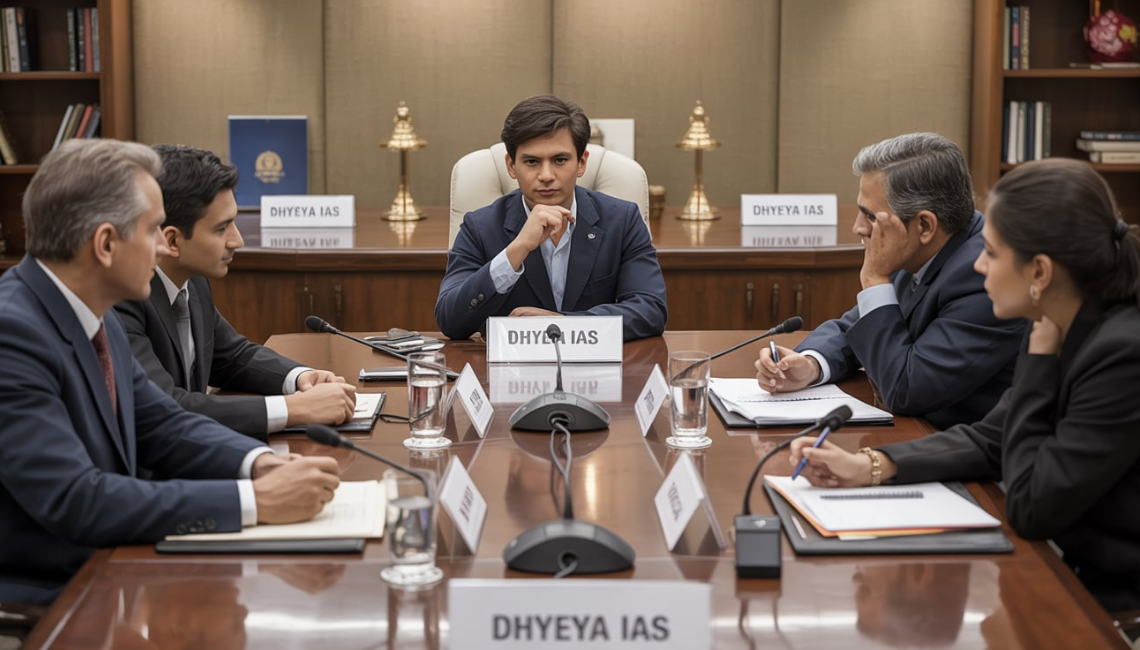The last and most conclusive stage in the preparation of the UPSC Civil Services exam is the Interview, commonly referred to as the Personality Test. This 275-mark interview, after months of rigorous preparation of the Prelims and Mains, is not a test of knowledge, but a test of personality, clarity of thought and ability to deal with pressure. This phase is one that many applicants take far too lightly, yet this is an area where experts and mock interviewers concur it is where confidence and composure intersect.
A guide to the UPSC Interview
The Interview is a 25-30-minute session, which is conducted by a group of senior members, typically presided over by a retired civil servant. These questions concern your Detailed Application Form (DAF), education, experience, interests, and views of your opinion about the current affairs. The panel does not have an interest in assessing the knowledge level you possessed but the way you think and react.
It is therefore important to emphasize on self awareness, moderation of viewpoints and good communication, which are the traits of a future administrator.
Mistakes that Candidates More Often Make
Even the most thoroughly trained candidates are not able to avoid unavoidable errors:
-
Excessive research of facts: Applicants tend to memorize the facts, yet the interview panel is interested in interpretation and not figures.
-
Faking confidence: Attempting to be over-assuming might back-fire. Authenticity is never compromised.
-
Disregarding the DAF: All the details in your DAF are possible questions. Ignoring yourself may create embarrassing situations.
-
Absence of situational awareness: A good number of those aspirants fail to demonstrate the ability to solve problems when put in a real life situation.
Inspirations from Mock Panelists
Mock interview replicate the actual UPSC experience and is a good source of feedback. The observations of the panelists, who are usually retired bureaucrats, experts in the subject, and even psychologists, may change the way one prepares:
-
Be Yourself: It is very easy to detect rehearsed answers in the interview board. Improved sincere and considerate replies are much more potent.
-
Be informed: To be informed and mature is to have an informed opinion on the current issues affecting the country and the world.
-
Listen Before You Speak: When it comes to listening, many aspirants just hurry to respond without having an idea of what the question is. A moment of pause is an indication of calmness.
-
Be Fair-minded: Shun Extreme opinions. Civil services require a restraint mind, empathy and open mind.
-
Body Language Speaks: A relaxed body posture, pleasant voice and eye contact produce an impression.
-
Know Your DAF: You must be ready to talk about your city of residence, your interests, your major at graduation and your optional paper.
Mock panelists highlight the point that the idea is not to develop a new personality, rather, it is to polish on what you are to make you a more confident and balanced person.
Conclusion
The UPSC interview does not measure brilliance, it is an interview, which measures maturity, integrity, and being quickly to the point. Candidates, who are calm, sincere, and reflective, usually tend to impress the best. Also, do not forget that preparation to the interview does not mean creating an image but presenting yourself to your best.
In Dhyeya IAS, the mock interview panelists have decades of administrative and academic background and come to sharpen the personality and presentation of the aspirants. Their graded feedback and simulated real interview training have enabled many candidates to be sure and clear in front of the actual UPSC board.







